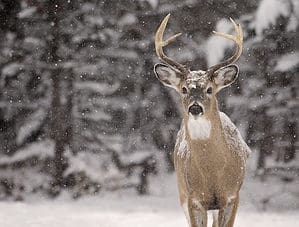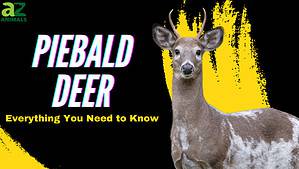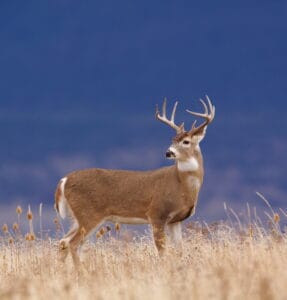New Hampshire’s deer season is open from mid-September to mid-December. The New Hampshire Fish and Game Department (NHFG) has divided the state into 24 Wildlife Management Units (WMUs).
The season dates and type of deer that can be harvested differ depending on the WMU. The season is split into four types: Archery, Muzzleloader, Firearms, and Youth only weekend. Before hunting, review all the current New Hampshire Fish and Game requirements for hunting.
Hunting License Requirements
Before hunting in New Hampshire, everyone must purchase a hunting license. You can purchase one online at huntnh.com, at the Fish and Game Department headquarters in Concord, NH, at the Fish and Game regional offices, or from a licensed agent (typically a sporting good or hunting supply retailer).
If you live outside of New Hampshire and would like to hunt, you must purchase a Non-Resident license. You cannot use a hunting license from your home state. A combination of Hunting and Fishing licenses are available. You can also purchase senior licenses at a discount. Lifetime licenses are also available by calling the NHFG Headquarters. You can purchase a lifetime license at a great discount for a child under one-year-old.
Anyone over 16 who is purchasing a license for the first time must take a hunter education class. This course is offered in person and online, with a portion being a separate field day for anyone older than 15. The current courses cover both firearms and archery.
If you took the course before January 1, 2014, the courses were split between firearms and archery. Depending on the season you wish to hunt, you will need to show proof that you completed both hunter and bow hunter education courses. Approved courses from other states are valid; you just need to present a previous hunting or archery license or a certificate of completion from the course you completed.
If you would just like to try hunting but have not taken a hunter education course yet, NH offers an Apprentice Hunting License. This allows you to hunt will a friend or family member that is 18 or older and has a hunting license. You can hunt for one year with the apprentice license, which you can only purchase once.
Depending on the season type you wish to hunt, you may also need to purchase a secondary deer hunting license. For each deer you harvest, you must have one deer tag corresponding to the hunting season. The base hunting license includes one deer tag and allows the taking of one deer during the regular firearms season.
If you would like to hunt during any of the other seasons, in addition to the base hunting license, you must purchase the corresponding license for additional tags. An Archery License includes one deer tag and allows you to take one deer of either sex during the archery season. A Muzzleloader license does not include a deer tag. Still, it allows you to take a deer using a muzzleloader or crossbow during the particular muzzleloading season using your firearms deer tag that is included with the base hunting license.
In addition to these Licenses, Special Permits are available that allow you to take additional deer beyond the tags that come with the licenses listed above. A Special Archery Deer Permit allows you to take an additional antlered deer during the archery season. Each hunter is limited to only one of these permits.
A Special Unit L Permit allows the taking of one antlerless deer in unit L, in addition to taking the deer allowed with other licenses. It may be used on any day during the season that the hunter holds a license (archery, muzzleloader, or firearm). A total of 2000 of these permits were available in 2022 and must be applied for in advance, typically in July.
A Special Unit M Permit allows the taking of two antlerless deer in unit M, in addition to taking the deer allowed with other licenses. It may be used on any day during the season that the hunter holds a license (archery, muzzleloader, or firearm). Four thousand of these permits were available in 2022 and can be purchased on a first-come, first-served basis at the NHFG headquarters.
Deer Season Types
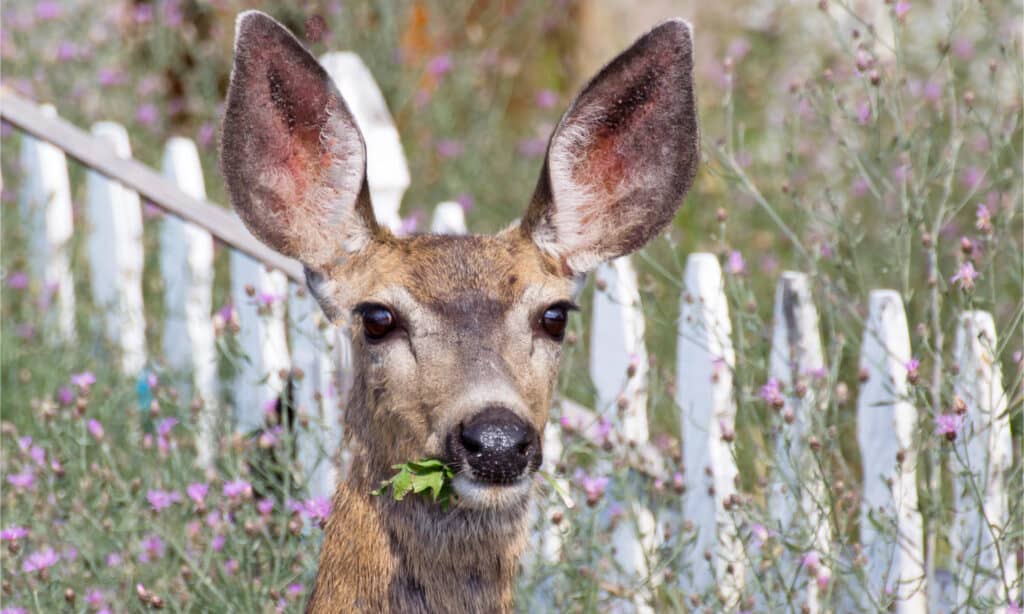
There are three deer hunting seasons in New Hampshire.
©Ginger Livingston Sanders/Shutterstock.com
New Hampshire has three deer hunting seasons: Archery, Muzzleloader, and Firearm. In addition, there is a special Youth Hunt weekend and a specific time when deer baiting is allowed. Archery season typically starts on September 15th and continues until December 15th, except for WMU A, which ends one week early.
Muzzleloader season starts in late October and continues for one week. This season varies slightly depending on the WMU, and the type of deer that can be harvested also can vary. Firearm season starts in early November and lasts until early December. Similarly to Muzzleloader season, the dates and type of deer that can be harvested vary depending on the WMU. Be sure to review the season dates on the NHFG website each year in the WMU you would like to hunt in.
Season Type Regulations
There are specific deer hunting season types in New Hampshire. Each season has specific requirements for the hunting device and methods used.
Archery Season
During this season, hunters must use archery equipment, including compound bows, longbows, and recurve bows. Crossbows may only be used during this season in WMU L or M or if you are 68 or older. Hunters must have their names and address on all arrows or bolts.
Broadheads must be used and be 7/8” in diameter or more extensive and less than 1 ½”. Retractable blade broadheads are allowed. The bow must have a draw weight of at least 75 pounds.
Crossbows have a rigid stock and a single string with a horizontally mounted bow. It can only permit a single bolt to be fired at once. A bolt is a short projectile resembling an arrow in the crossbow. The crossbow must have a minimum pull weight of 125 pounds, a working mechanical safety, and a total length of no less than 25 inches.
No firearms are allowed during this season. However, hunters may legally carry a sidearm but can not use it to assist in taking deer.
Muzzleloader Season
Muzzleloaders are single-barrel, single-shot firearms that can only be loaded from the muzzle end of the barrel. Muzzleloading rifles may be used that are at least .40 caliber or larger. Crossbows may be sued in all WMUs during this season.
As referenced above, only one deer may be taken during this season with the firearm tag and base hunting license. You do not have a separate tag for Muzzleloading season like for Archery season. Modern firearms that use cartridges are not allowed during this season.
Firearm Season
Firearms are modern guns that fire cartridges loaded from the barrel’s breech. These weapons include guns like rifles, handguns, and shotguns. As described above, muzzleloaders and crossbows may also be used during the firearm season. For rifles and handguns, they must use centerfire cartridges, must be .22 caliber or larger, and cannot be loaded with more than six rounds of ammunition. Full metal jacket ammunition is not allowed.
Shotguns have to fire slugs or buckshot that is 00 buckshot or larger. However, some areas prohibit buckshot (Auburn, Chester, Greenland, Newington, Portsmouth, and Stratham). Air rifles are not allowed during this season.
Some towns have specific requirements on the calibers of rifles and handguns that can be used. See the NHFG website for the specific list; they generally range from .357 caliber to .50 caliber, with 9mm being omitted.
Handguns in these areas cannot be loaded with more than six rounds of ammunition at any time. There are also specific areas where all hunting is forbidden with firearms other than a shotgun, muzzleloading rifle, bow, or crossbow. These areas are generally in the southern areas of the state, be sure to check this map on the NHFG website.
Youth Gun Season
This season is typically open for one weekend in late October and only for youth hunters under 16. There is no minimum age restriction in NH. However, the youth hunter must be accompanied by an adult hunter at least 18 years of age and properly licensed. Accompanied means the adult must be within close sight and hearing distance and can physically give direction and take control if needed.
Youths under 16 are not required to have a license or take a hunter education course, but they must have a unique deer tag that can be printed free of charge from the NHFG website.
Baiting Season
Baiting season is a specific period in the fall when hunting over a bait site is allowed. You must submit a baiting permit application to the NHFG, and there is no fee for this permit. No bait should be placed until two copies of the bait permit and map have been submitted to the NHFG headquarters in Concord.
Bait may not be placed at any site until the baiting season for deer is open. A sign must be placed at the site with the names of the permittee and up to 2 sub-permittees. These three individuals are the only people allowed to hunt over the permitted bait site. There are also other specific regulations concerning baiting. These should all be reviewed before starting a bait site.
Overall Regulations and Safety
While hunting in NH, there are many regulations to keep track of. Below are some fundamental rules, but this is not an exhaustive list. Review the rules with the NHFG before going hunting in New Hampshire.
All deer harvested in NH must be tagged with a deer tag with a license or permit. There are no specific bag limits. Instead, the limit of deer you can harvest depends on the number of legal tags you possess.
You can only hunt 30 minutes before sunrise to 30 minutes after sunset. Even having a loaded gun in a hunting area outside of these times can lead to fines.
If you are hunting with a firearm or bow during any hunting season, you should wear a hat, vest, or other garment made of hunter-orange color material, visible from all sides at a minimum distance of 200 feet.
It is illegal to discharge a firearm or shoot a bow and arrow or crossbow while hunting within 300 feet of a permanently occupied dwelling without permission from the occupant or within 300 feet of any school, medical building, commercial building, or outdoor public gathering place.
Discharging a firearm, bow, or crossbow from, within 15 feet of, or across the traveled portion of a roadway is not allowed.
If you use a tree stand, ladder, or an observation blind that damages or destroys a tree by inserting metal objects into it, you must have written landowner permission.
Using an uncrewed aerial vehicle, such as a radio-controlled drone, to attempt to locate or assist in taking deer is not allowed.
Hunting from inside or on any motorized vehicle, such as a car, airplane, or OHRV, is prohibited. Hunting from a boat or canoe is allowed as long as all movement from mechanical power is stopped.
Since weapons are involved, hunters should always keep safety as a top priority. Handle your firearm or arrows with respect, and allows get a clear ID on your target. Make sure you know what is beyond your target. Also, ensure a full view of the deer you are targeting and if it is antlered or antlerless before taking a shot.
Observe what is beyond your target deer, and if you miss your target, what may be hit instead. Larger caliber weapons also can pass through a deer. Know what is on the other side of your target. It is possible to take two deer with one shot, which may be illegal if you do not have the proper permits.
Most people think the majority of hunting accidents are firearms related. More injuries occur from hunters falling out of tree stands than from being shot by other hunters. Make sure to use a safety strap any time you use a tree stand. Know your equipment and practice with it before hunting. Be sure to check on any minor’s equipment, as well.
Chronic Wasting Disease Concerns in New Hampshire
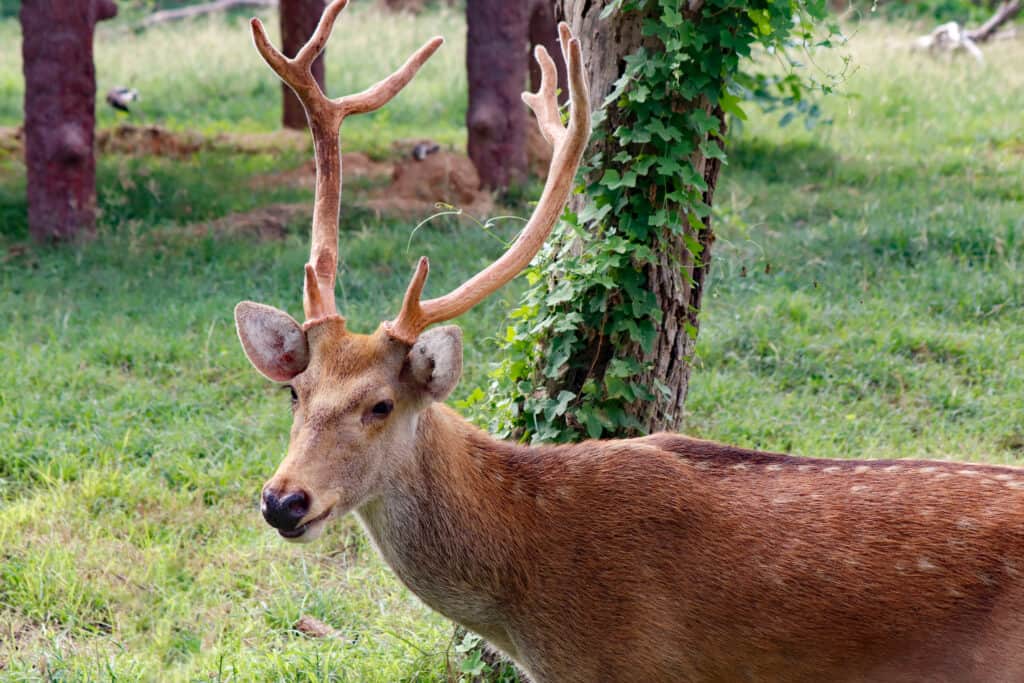
CWD has not been detected in New Hampshire.
©Sunil lodhwal/Shutterstock.com
Chronic Wasting Disease (CWD) is similar to mad cow disease. It causes death in deer, moose, and all cervids. CWD has not been detected in New Hampshire, but it has been detected in other states and Canada. Deer infected with CWD appear very thin, drool excessively, may move strangely, and look nervous, confused, and unaware of their surroundings.
To prevent the spread of CWD into New Hampshire, the importation of hunter-killed white-tail deer, black-tail deer, moose, and elk carcasses from CWD-positive areas is prohibited. If you want to bring a harvested deer into New Hampshire from out of state, it should be fully processed for consumption and a completed taxidermy mount. The meat must be de-boned, and no other tissues are allowed.
Currently, no CWD case has been reported in people. However, it may prove to be a risk in the future. The more the disease contacts people, the more likely this is to happen. While handling a harvested deer, it makes sense to be safe, just in case.
Wear rubber gloves anytime you handle the deer, especially while field-dressing it. Remove the bones completely and clean your hands and instruments afterward. Do not eat any deer’s brain, spinal cord, eyes, spleen, tonsils, or lymph nodes.
What to do After a Deer is Harvested?
After you have bagged your deer, the tag should be detached from your license or permit. Fill out the tag and attach it to the deer. After these steps have been taken, you may process the deer and transport it. The tag must remain attached until processing is complete.
You must register your deer at the closest open registration station 24 hours after the harvest.
The deer must be accompanied and registered by the person who harvested the deer. A conversation officer may also request to see the head and hide of a deer taken under an archery license within 48 hours of the kill. After registering your deer, you may butcher it yourself or take it to your favorite processor or taxidermist.
Fines for Not Following Regulations
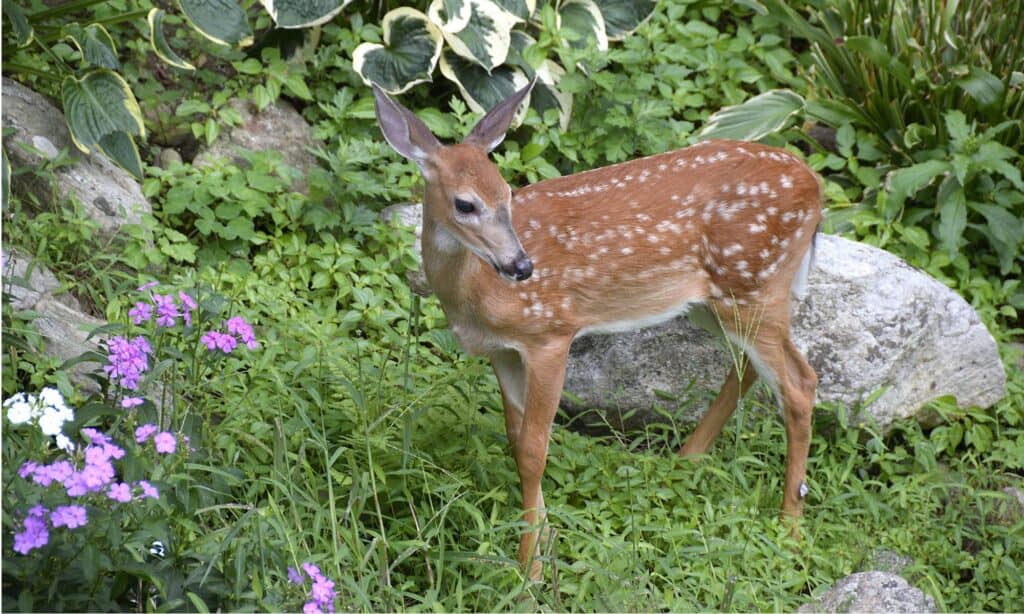
Harvesting deer illegally in New Hampshire can result in jail time.
©iStock.com/tmphoto98
Not following the regulations and harvesting a deer illegally in New Hampshire can result in fines and license suspension. If your case goes to court, court costs and lawyer fees can be costly, even if you are acquitted. For example, transporting wildlife across state lines taken, possessed, or sold in violation of state law is also a violation of federal law.
The penalty may be up to $250,000 and 5 years in prison. In 2013, a New Hampshire man pled guilty to a Class A Misdemeanor of taking more than one deer in a calendar year. His hunting license was suspended for two years; the hunter was fined $750 and given a 12-month suspended sentence for three years of good behavior.
Before hunting deer in New Hampshire, review and understand the regulations and requirements for hunting.
The photo featured at the top of this post is © iStock.com/Tiago_Fernandez
Sources
- New Hampshire Fish And Game (1970) wildlife.state.nh.us/hunting/deer-wmu.html
- E Regulations (1970) eregulations.com/newhampshire/hunting
Thank you for reading! Have some feedback for us? Contact the AZ Animals editorial team.



